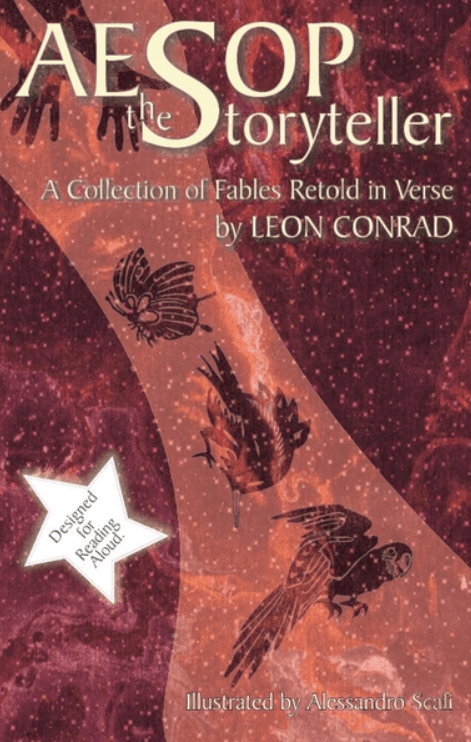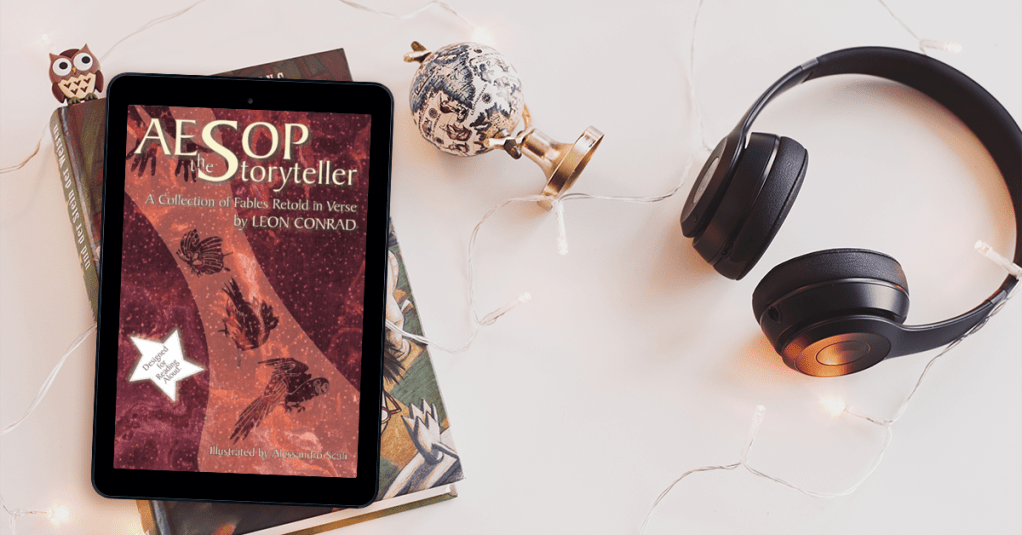Will the stag escape the hunters? Did the lion eat the mouse? And why exactly did the fox invite the stork round to share a meal?
Find your own answers to these questions as you engage with the stories retold here by Leon Conrad in the rich oral storytelling tradition.
The layout of this book is specially designed to encourage reading aloud. The fables are perfectly complemented by Alessandro Scafi’s charming illustrations. Leon’s virtuosic readings of the poems are also available as an audio book.
So awaken your mind and lend me an ear –
Come, free your senses. I’ll take you to where
There’s a magical place, filled with creatures with flair –
A country of wolf, sheep, of crow, stork and bear,
Of talking trees, rabbits, the fox in his lair …
The power of these stories will take us right there.
My Review
So why is it that fables always seem to revolve around lions, foxes, wolves, and crows, with the occasional mule (or donkey), mouse and dog thrown in? Is it because they are crafty? Or brave? Apart from the mule that is. I wasn’t sure about the dog. So I hope the author won’t mind that before reviewing the book, I wanted to do some research.
It appears that certain animals are the most often represented in fables and each has its own meaning. Lions are strong, proud and fearless. In Christian symbolism the wolf may represent the devil. The mule is stupid and foolish. The mouse is clever and cunning, like in the story of The Lion and the Mouse.
“Please let me go. Please let me go and play.
You never know – I might be useful to you one day.“
Foxes are clever, but we knew that. They are also used to getting what they want, like in The Fox and The Grapes
“WANT them!
WANT those grapes.
DIG those grapes
And their groovy shapes.“
The dog is loyal and selfless. However in this poem, Wild Dog Dingo’s Winter, the dingo is a wild dog, so he has no-one to be loyal to.
“And so, the seasons flow –
Even though here I must leave
Our story and that little,
Shivering, curled up ball of fur
Which is our wild dog Dingo.”
The crow, like the wolf, often represents evil and is the harbinger of death, but I dispute this, as I am a bit obsessed with Corvids in literature and feel they are misunderstood. They are patient and intelligent, and in The Fox and the Crow, the crow manages to outwit the fox, and in the end, they learn to respect each other. I love how the fox tricks the crow into dropping the cheese, but the crow gets wise and when they next meet, he hides the cheese first so he doesn’t lose it. At their final meeting, when they are both old, the fox breaks the cheese in half and they share. Now if there isn’t a moral in there somewhere, I’ll be damned. Or maybe we should just call it a guide for life.
“Now you won’t find one moral printed here in this book
And it just doesn’t matter how hard you look.
I’m sorry if you think I’ve taken them away –
I haven’t. It’s how Aesop told them way back in his day.
He wanted to help people think matters through
For themselves.…”
I really loved these verses. The most famous fables are all here, but with added humour. They are written in a way that begs to be read aloud to children of all ages. Adults will enjoy the nostalgia if you remember these from your own childhood. Hopefully you remember them with fondness (unlike my earliest experiences of Struwwelpeter, which terrified the life out of me and still does). And I must also say that the illustrations are beautiful.
I didn’t want to attempt an academic study of the place of fables in the modern world or ‘criticise’ the structure of the poetry, as that would be ridiculously arrogant of me. I just loved the verses for their beauty and simple storytelling.
Many thanks to @LiterallyPR for inviting me to be part of the #AesopTheStoryteller blog tour.
About the Author
Leon Conrad is a multi-award-winning, traditionally published author and storyteller. He has been a regular columnist, had articles published in journals and magazines, written theatre shows, and contributed to radio programmes. He teaches creative writing and is a meticulous and collaborative editor and story structure consultant to both fiction and non-fiction writers, ‘plotters’ and ‘pantsers’ alike.
Buy Link
www.amazon.co.uk
Goodreads
www.goodreads.com
Handles/Tags
Literally PR
Instagram – @literallypr
Twitter/X – @literallypr
Leon Conrad
Instagram – @LeonConradStory
#AesoptheStoryteller



